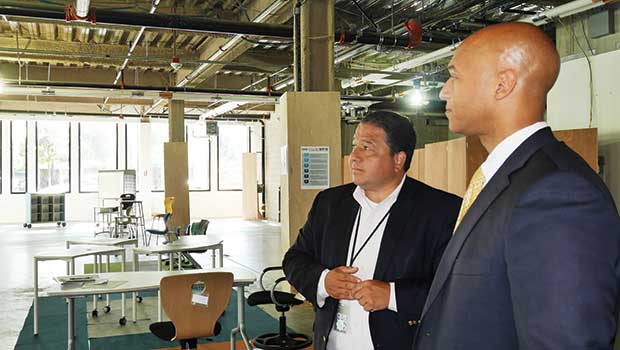
The city of Boston once again is seeking a full-service restaurant tenant for the large vacant space at the front of the Bruce C. Bolling Building in the heart of Dudley Square.

Author: Sandra LarsonJohn Barros shows the vacant 7,800-square-foot space at the front of the Bolling Building and discusses the city’s and the community’s desire to see a full-service restaurant there.

Author: Sandra LarsonOutside the window-lined ground-floor space, a wide sidewalk area could accommodate outdoor seating. The city and community have long sought uses for the space that would enliven Dudley Square beyond daytime business hours.

Author: Sandra LarsonDudley Dough and Gallery Eye Care are two of the businesses occupying the Bolling Building’s smaller storefronts. Customer foot traffic in Dudley Square still lags outside weekday business hours.
On the Web
City of Boston RFP announcement: http://bit.ly/2ijC90S
The window-lined site at the iconic “point” of the former Ferdinand’s furniture store has sat empty since the $115-million city-developed building opened in 2015, serving as the headquarters for the Boston Public Schools.
Finding the right restaurateur-tenant for the prominent location is critical to an enlivened Dudley Square, say experts and community stakeholders. Its two-year vacancy underscores the challenges in bringing new economic vitality to a square that has served as a commercial hub for a largely low-income neighborhood.
The Bolling Building’s street-facing retail spaces were intended to inject commerce and evening social activity into the area around Dudley Station, which in the past was a bustling retail center and now sees some 35,000 transit users daily.
All five smaller ground-floor commercial sites were filled in 2015, by Gallery Eye Care, Final Touch boutique and three casual eateries — Dudley Dough, Dudley Cafe and Tasty Burger — but no viable proposals emerged for the prime front space, which had been designed to accommodate the community’s desire for a local sit-down dining option.
“The big challenge was the capital and experience required to build out the space fully,” said John Barros, the city’s economic development chief, during a recent press tour of the 7,800-square-foot space. Restaurateurs who responded to the initial request for proposals (RFP) in 2013 estimated the upfront costs would be $700,000 to $1.8 million, depending on the proposed kitchen size and other factors, he said.
Now, the city is trying again. A new RFP was released this month with a deadline of Sept. 27, and Barros believes someone will step up with a proposal that can succeed.
With the municipal building now up and running — along with other large mixed-use developments taking shape in its vicinity and the entry of new restaurants such as Suya Joint — opening a restaurant in this flagship space is viewed as less risky.
“That’s why we haven’t divided it up,” Barros said. “Some people have suggested alternative uses, but … we really want to give the full-service restaurant [idea] a full chance.”
Documented community desire
Throughout the lengthy series of public meetings convened during the municipal building’s design and construction phases, residents repeatedly voiced the need for a local restaurant with sit-down table service.
“There has to be a mechanism to bring the community together. We have to implement a full-scale restaurant,” Dudley Vision Advisory Task Force member Donovan Walker told the Banner at the spring 2012 groundbreaking for the new building, summing up the community’s oft-stated desire. “We have 60,000 people in Roxbury with no central place to sit down and eat.”
The city commissioned a survey in 2012 to gauge what Dudley area residents, employees and commuters wanted to see added to the neighborhood mix. A sit-down restaurant and live music lounge topped the list, along with other uses that would encourage social gathering and remain open in the evening, such as a coffee shop, bakery and bowling alley.
The survey also revealed that residents routinely spent their dining dollars outside the neighborhood at full-service restaurants such as Friday’s, Olive Garden, Applebee’s and Legal Seafood, suggesting that if an appealing alternative opened in the heart of Dudley Square, some of that money could be kept within the neighborhood.
With these things in mind, city officials made sure the building’s design included a large commercial space. At the site last week, Barros and BPS Chief of Staff Rob Consalvo pointed out ventilation ducts and electrical panels that were built in to make it restaurant-ready. As an added attraction, the wide sidewalk could hold outdoor tables, they noted.
Building an ecosystem
The right restaurant in this key location could serve as a welcoming “agora” of sorts, said Steve Grossman, CEO of the Initiative for a Competitive Inner City, referring to the ancient Greek word for a center of athletic, artistic, spiritual and political life.
“I have absolutely no doubt that if the city can recruit a restaurant that appeals to the neighborhood and to people outside the neighborhood, it would create sustainable business activity that would radiate well beyond the restaurant itself,” he told the Banner.
Grossman’s organization, headquartered in Dudley Square near the Bolling Building, studies what makes urban economies and businesses thrive. While ICIC has not analyzed Dudley specifically, Grossman sees potential here for the type of business cluster shown to catalyze economic development.
“It’s all about the ecosystem,” he said. “Food clusters are destinations that bring traffic and energy, excitement, profits and — not surprisingly — a growth in good-paying jobs. When a restaurant is created and they hire people, overwhelmingly it’s people from the neighborhood.”
A tricky balance
Despite the benefits, luring a “destination” restaurant that brings in dollars from outside but also serves as a community-friendly spot for locals can be a tough balancing act. For instance, community members hope to see local entrepreneurs, rather than a large chain, occupying this highly-visible location — but given the high build-out and rent costs, there’s a good chance that only a well-moneyed, established entity could take on the risk. The nearby South End neighborhood is often cited as a successful restaurant district but also as a prime example of over-gentrification and displacement.
Local stakeholders expressed a mix of optimism and concerns about the prospects for a restaurant filling to the Bolling Building vacancy.
Fred Fairfield, a longtime local contractor and developer who has served on the Dudley Square Main Streets board and the Dudley Vision Advisory Task Force, suggested that while he would like to see a jazz club in the space — especially one that served lunch and displayed local art — an alternative could be a food court like that of South Shore Plaza, which includes sit-down options.
“I always thought to get the space activated, we could put in a food court with many different restaurateurs there that could survive with each other,” he said. “It would be great for people working in and around Dudley and it could help [smaller] restaurants stay in the area.”
Among the nearby developments in the works are the Melnea Hotel and Residences under construction at Washington Street and Melnea Cass Boulevard and the proposed Rio Grande development that could bring a 25-story tower with hundreds of apartments and condominiums, many of them market-rate, a stone’s throw from the Bolling Building.
Fairfield believes nearby residential development will give a healthy boost to local business prospects.
“This is what we need in and around Dudley — housing, to bring people in and keep people in. The more housing we have the more people will shop and eat in Dudley,” he said.
Continuing challenges
Fairfield, who grew up in Roxbury and is a past president of the Dudley Square Merchants’ Association, did not mince words regarding some of the square’s obstacles for businesses, even with the shiny new Bolling Building in its center.
“We have to clean up the area,” he said. “There are still a lot of vagrants, a lot of drugs and drinking, trouble I thought would be cleared up a lot quicker. Until that happens, it’s going to be difficult to draw in the high-quality restaurants and bistros.
Luther Pinckney is the manager of Dudley Dough, the pizza-focused offshoot of the nonprofit Haley House. If a successful restaurant does open in the front space, it could help adjacent businesses like Dudley Dough by bringing more people to the area, he said. While he sees the influx of some 500 BPS workers as helpful to nearby businesses, customer traffic drops sharply on evenings and weekends.
“On Saturdays we don’t cover expenses unless we have a major function,” he said.
At the same time, he questioned whether large restaurant and nightclub uses are truly suitable for the site.
“Is it really the best place for a live music venue?” he asked, noting that the building offers no parking, and the available space lies directly below the room where evening School Committee meetings are held.
“Roxbury needs a jazz spot,” he said, “[but] whether it needs to be in the Bolling Building, I don’t know.”
Leaving the community in
Pinckney suggested that other good uses for the site might be a theater, function space or a place for residents to access city services.
Regardless of who leases the last vacant space, he said Dudley Dough will continue its efforts to draw the existing local community into the Bolling Building, holding events from political candidate forums to immigrant rights workshops to family game nights.
“We need to know that people near and far feel comfortable coming into this lovely building in the heart of Roxbury,” he said.
Pinckney serves on the Project Review Committee for the proposed Rio Grande project. He sees that, if built, it could pour some welcome disposable income into the area; on the other hand, existing residents could be left out of the resulting growth.
“I know I sound like I’m part of the ‘no, no, no’ crowd,” Pinckney said. “I just want and hope that people in the community speak up and let the city know what they want to see there. Gentrification is coming — but it needs to be managed in a way so that existing residents can benefit.”






